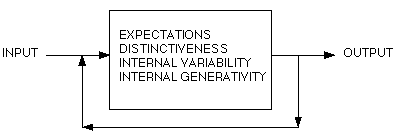Neurobiology and Behavior 2002
 
| Welcome to the home page of Biology 202 at Bryn Mawr
College. Pleased to have you here. I'm looking forward to an interesting,
enjoyable, productive semester of "getting it
progressively less wrong". You too, I hope. Let's have some fun, and see what we can make out of it together. For
everyone.
|
|
|

|
Some course starting points:
From literature - Emily Dickinson
(1830-1886)
:
The Brain - is wider than the Sky -
For - put them side by side -
The one the other will contain
With ease - and You - beside-
The Brain is deeper than the sea -
For - hold them - Blue to Bue -
The one the other will absorb -
As sponges - Buckets - do
The Brain is just the weight of God -
For - Heft them - Pound for Pound -
And they will differ - if they do -
As syllable from Sound -
| |
And from history:
Course announcements
Browse around. Get a sense of what's here, and how it does (or doesn't) relate to
things you might be interested in. Think about what you think you know about brain
and behavior, and why, and what puzzles you, and why. And expect to be wrong, over
and over again. That's the best starting place ... for any kind of scientific
inquiry.
Email comments on second web paper GUARANTEED by end of Sunday. Apologies for delay.
Final paper due by 5 pm Friday, 10 May for seniors, 5 pm Friday, 17 May for others. E-version as per earlier papers, hard copy in box outside Room 106.
Is Emily's a useful way to think about things? Check out your original thoughts, leave final ones in course forum area.
Forum Archive
- Week 1
Does the "brain = behavior" hypothesis fit your observations/experiences/ways of
making sense of the world? If so, explain why. If not, explain why not. In
either case, suggest new observations which might serve to further explore the
hypothesis. (one person's summary of responses)
- Week 2
So ... we've got input/output boxes inside input/output boxes, LOTS of them. And
brains which seem to differ in organisms who behave differently. What does that do
for our "brain=behavior" discussion?
- Week 3
What's your reaction to the phenomena of quadriplegia as described in class? Is
the addition to our model of an "I-function" box appropriate/useful? Why or why
not? What new problems/questions does it raise?
- Week 4
We've gotten to neurons, the smallest boxes of the nervous system, and discovered
that they all pretty much use basically the same "signal", an action potential.
What does this (and the associated "see thunder and hear lightning" problem) do for
our "brain=behavior" idea? What new problems do we have to contend with given what
we know about action potentials?
- Week 5
We've discovered that signals can indeed start in the middle of the nervous system, that neurons are each little computers, and that there are both excitatory and inhibitory signals. Does that change how one thinks about behavior? the brain? the relation between them? What new issues does it raise?
- Week 6
And a break point in the course, so ... what do you think? We started with brain=behavior and now know brain is neurons with ionic gradients, variable membrane permeabilities, and current flows, which respond to and release chemicals. Is that enough? to account for behavior, including experience? What would it take to get from where we are to that? Do you think we can do it?
- Week 7
We've talked about action as motor symphonies, about central pattern generators, about corollary discharge, and about negative feedback loops. All neurons, organized by genetic influences and by experience, but starting to make more sense of what is between neurons and behavior? What do you think? What can we begin imagining we can account for? What is still hard to account for? (including a lot about pain)
- Week 8
We got the idea of the "I-function" originally from thinking about Christopher Reeves, way back at the beginning of the course. It arose again in thinking about "pain", and again in connection with thinking about spastic paralysis resulting from neocortical damage. How useful is this concept? In thinking about behavior? In thinking about the nervous system? What new and relevant observations might come from our current inquiry into the input side of the nervous system?
|
Course Home Page
|
Course Forum |
Brain and
Behavior |
Serendip Home |
Send us your comments at Serendip
 © by Serendip 1994-
- Last Modified:
Wednesday, 02-May-2018 10:53:09 CDT
© by Serendip 1994-
- Last Modified:
Wednesday, 02-May-2018 10:53:09 CDT




